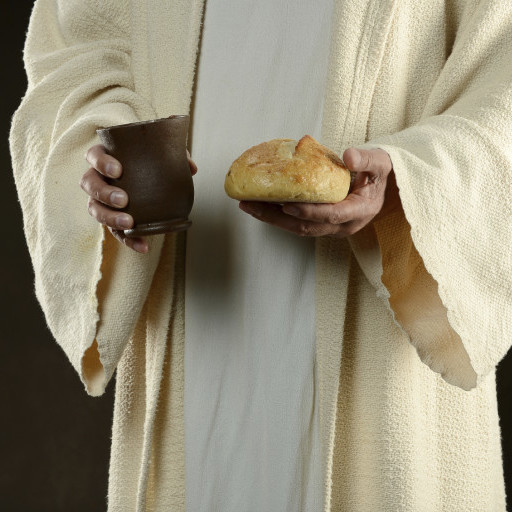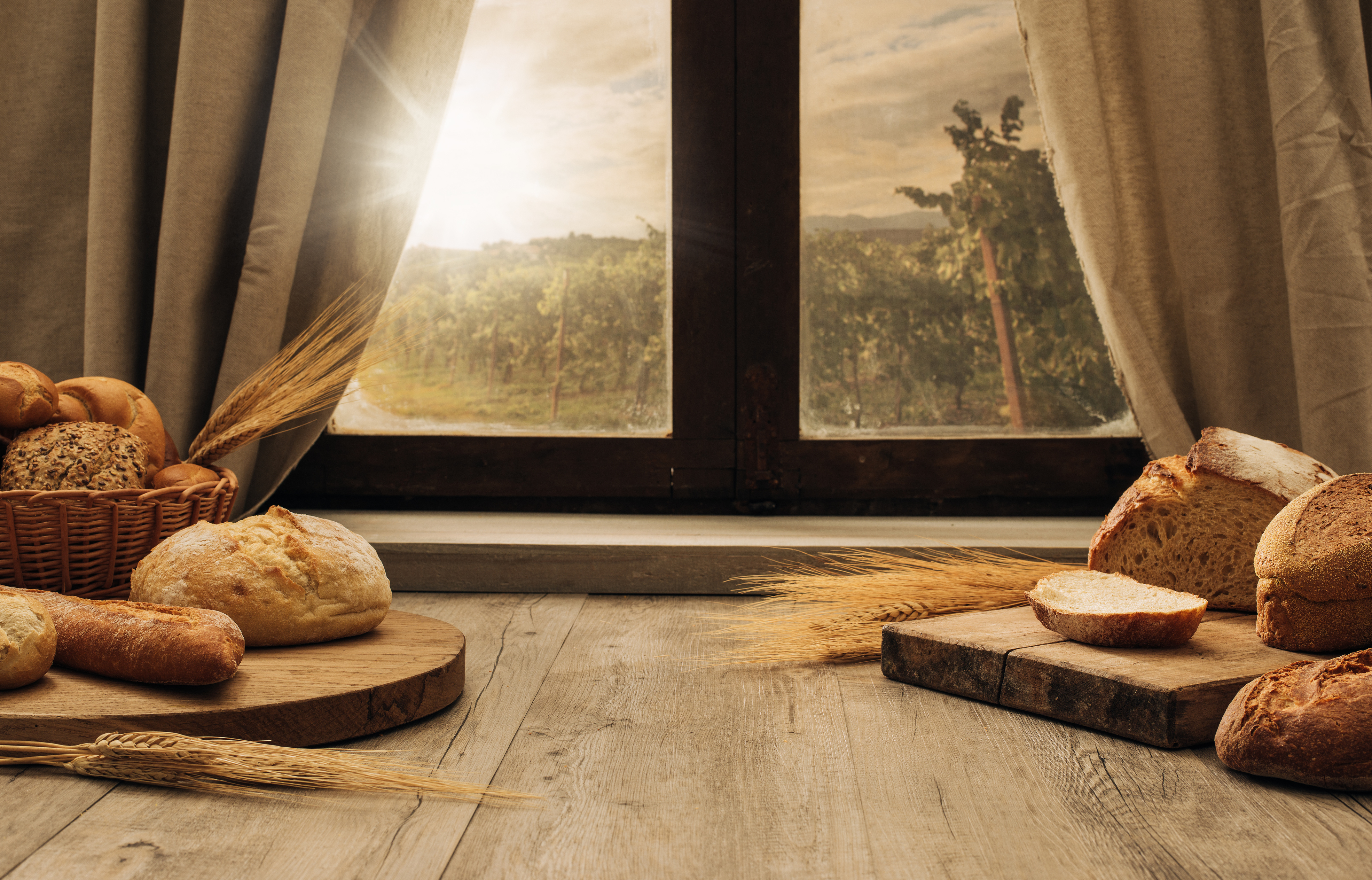To sanctify or in ancient Hebrew “Qadash” means to set apart, be consecrated, be hallowed, be honored, be treated as sacred, be holy, be dedicated, to keep oneself separate[i] from the world even as God Himself is separate from the fallen world.
In the Old Testament, the Shewbread or Bread of the Presence was considered holy bread or “lehem qadash”[ii] in Biblical Hebrew. It was made from fine flour from the ancient grain Einkorn[iii] of the earth, baked in large ovens, formed in the shape of a square U[iv] or upside-down Hebrew letter “chet”, which means “God’s essential life” or “life to enliven”. In ancient times, each Hebrew letter had its own story and when letters were combined, the stories combined to give each word a chapter of meaning that can never be translated properly.[v] Baking signified the fiery trial of faith, like Shadrach, Meshach, and Abednego in the fiery furnace[vi] or Peter who said about fiery trials being in the similitude of Christ’s sufferings:
Peter 4:12-19 King James Version (KJV)
12 Beloved, think it not strange concerning the fiery trial which is to try you, as though some strange thing happened unto you:
13 But rejoice, inasmuch as ye are partakers of Christ’s sufferings; that, when his glory shall be revealed, ye may be glad also with exceeding joy.
14 If ye be reproached for the name of Christ, happy are ye; for the spirit of glory and of God resteth upon you: on their part he is evil spoken of, but on your part he is glorified.[vii]
The Shewbread was then sprinkled or anointed with pure Frankincense and placed on The Table of the Presence.[viii]This table was inside the front door of the Temple, and it signified that “God’s light forever shines on His people.”[ix]
The Frankincense anointing meant the inward parts were cleansed of all evil in much the same way the ancient Priests of Israel were anointed with oil made of Frankincense Myrrh, Cinnamon, and Olive Oil. It reminds one of the three gifts of the Magi summarized by Biblical Archeology Review:
In addition to the honor and status implied by the value of the gifts of the magi, scholars think that these three were chosen for their special spiritual symbolism about Jesus himself—gold representing his kingship, frankincense a symbol of his priestly role, and myrrh a prefiguring of his death and embalming—an interpretation made popular in the well-known Christmas carol “We Three Kings.”[x]
The Shewbread would miraculously remain fresh for 1 week, partially because it was unleavened or not contaminated with putrefying substances like yeast. Then the Holy “Qadash” or Set apart Priests of the Temple ate it in a holy place.[xi]
There are many things that are sanctified or set apart from the world by God or his ordained ministers.
The Seventh Day of Creation
The Jubilee Year
The alters of the Patriarchs
The sacrifice on the alters
The Tabernacle
The Temple
The Arc of the Covenant
The Incense alter
The alter in the Holy of Holies
The Shewbread Table
The Shewbread
The Priests who served in the Temple
The people of Israel
The early Christians
Anything touched by the Holy Spirit
Jesus Christ
Combining all the imagery present in the word Sanctify would require many volumes, but in essence, it means to be separated from the world of sin in much the same way God is set apart from the world and lives in Heaven, wherein no unclean thing can dwell. When we eat the Bread of Life that has been set apart and sanctified from all unrighteousness and contamination, we cleanse our inward parts and become the Holy Nation or People God has always wanted us to be.
Sanctification is the process by which partaking of the sacrament and remembering our covenants to keep them works miracles of heavenly change inside of us. The suffering and death of Jesus Christ, His blood (the water and the wine) and His flesh (the bread), cleanses us from the stain of our own sins, much like the baptism of water and fire does symbolically. All are invited, all can be cleansed, all will be drawn to Christ and lifted up even as He was lifted up on the cross. This cleansing and purifying by the Holy Ghost is given by the grace of Christ, since we do not merit anything because of our weakness and sinful natures. He draws us to Him. He knocks on the door of our hearts. He waits patiently for an answer, even when it takes a lifetime. He is all considerate of our weakness, and failure to appreciate His work for us. He has all power in Earth and Heaven to save every soul to comes to Him on conditions of repentance. His love overwhelms us, but we resist and turn away from the bounteous goodness that flows so freely, so full of mercy for the frailness of the human condition.
This purifying sanctification gives us a new heart that no longer has any desire for sin, another gift of grace. Jesus Christ wants more for us than a one time experience with this process, leaving us to be blown around by the many winds of adversity. His covenant with us is new and everlasting. He wants us to have a new heart forever, a perpetual spiritual life, and a daily effort to live worthy and clean to have His divine Presence symbolized by the Bread of His Presence.
[i] https://www.biblestudytools.com/lexicons/hebrew/nas/qadash.html
[ii] I Sam. 21:1–7 see https://www.jewishvirtuallibrary.org/shewbread-or-showbread
[iii] https://www.healthbyvalentina.com/wheat-of-the-bible/
[iv] https://www.templeinstitute.org/baking-the-showbread.htm
[v] Ginzburg Yitsḥaḳ, and Avraham Arieh. Trugman. The Hebrew Letters: Channels of Creative Consciousness. Jason Aronson Inc., 1992. Pages 122-23
[vi] Daniel 3:1-30
[vii] https://www.biblegateway.com/passage/?search=1+Peter+4%3A12-19&version=KJV
[viii] Exodus 25:23-30
[ix] https://www.bible-history.com/tabernacle/TAB4The_Table_of_Shewbread.htm
[x] https://www.biblicalarchaeology.org/daily/people-cultures-in-the-bible/jesus-historical-jesus/why-did-the-magi-bring-gold-frankincense-and-myrrh/
[xi] https://www.bible-history.com/tabernacle/TAB4The_Table_of_Shewbread.htm

